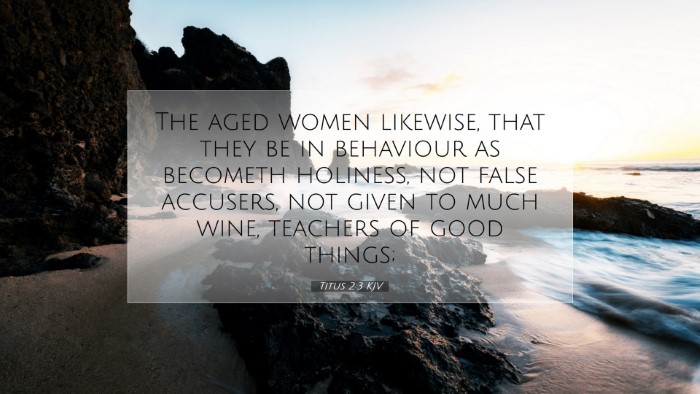Old Testament
Genesis Exodus Leviticus Numbers Deuteronomy Joshua Judges Ruth 1 Samuel 2 Samuel 1 Kings 2 Kings 1 Chronicles 2 Chronicles Ezra Nehemiah Esther Job Psalms Proverbs Ecclesiastes Song of Solomon Isaiah Jeremiah Lamentations Ezekiel Daniel Hosea Joel Amos Obadiah Jonah Micah Nahum Habakkuk Zephaniah Haggai Zechariah MalachiTitus 2:3
Titus 2:3 KJV
The aged women likewise, that they be in behaviour as becometh holiness, not false accusers, not given to much wine, teachers of good things;
Titus 2:3 Bible Commentary
Commentary on Titus 2:3
Titus 2:3 states: "Likewise, teach the older women to be reverent in the way they live, not to be slanderers or addicted to much wine, but to teach what is good."
Contextual Overview
The epistle to Titus, authored by the Apostle Paul, emphasizes the importance of sound doctrine and the proper conduct of Christians within the community. Titus, appointed as a leader in Crete, is instructed on how to cultivate a mature and godly church. This verse focuses specifically on the role of older women and provides guidelines for their conduct, reflecting their influence within the church and family.
Exegesis of the Verse
- Older Women: The term "older women" implies those who are mature in faith and life experience. Henry emphasizes that age should be associated with wisdom and spiritual maturity.
- Reverent Behavior: The call for being "reverent" indicates a lifestyle that honors God. Barnes comments that this reverence is reflected in both attitude and action, suggesting a life characterized by dignity and holiness.
- Warning Against Slander: Paul warns against slander and gossip. Clarke highlights that older women must refrain from using their words destructively, as their influence can greatly affect church dynamics.
- Stewardship of Substance: The admonition against "much wine" speaks to self-control and moderation. Henry reflects on how such habits can lead to a loss of credibility and spiritual authority.
- Teaching Good Things: The ultimate purpose of their respectable conduct is to enable them to teach what is good. Barnes notes that teaching is not merely formal education but includes the demonstration of godly living.
Theological Implications
This verse highlights the intergenerational aspect of church life where older women serve as mentors and examples for younger women. It underscores the importance of spiritual mentorship in the community of faith. Paul reflects a foundational theology that emphasizes wise living and teaching, rooted in a profound understanding of God’s grace.
The call for older women to live reverently suggests a connection between personal piety and communal responsibility. Their conduct is not only a reflection of personal faith but also shapes the faith of others around them. Clarke asserts that this highlights the sanctity of role models within the church structure.
Practical Applications
- For Pastors: Encouraging older congregants to take active roles as mentors can foster a nurturing environment that promotes growth in faith. Pastors should facilitate environments where wisdom can be shared.
- For Students: Engaging with older mentors can provide invaluable insights into faith and practice. Understanding this dynamic can help students appreciate the breadth of learning available beyond formal education.
- For Theologians: This verse invites a deeper exploration of how gender roles have evolved in scriptural interpretation and community life. It challenges scholars to consider the implications of mentorship and teaching styles throughout church history.
- For Bible Scholars: A thematic analysis of mentorship in the New Testament can yield rich insights into community dynamics and the role of women in the early church. Scholars should examine cultural contexts that inform these teachings.
Conclusion
Titus 2:3 serves as a pivotal verse that not only highlights the responsibilities of older women but also frames the broader context of communal faith practices. The guidance provided by Paul is not merely historical; it carries timeless relevance for the church today, reiterating the significance of character, teaching, and mutual encouragement in the body of Christ.
As older women embody reverence and good conduct, they fulfill their calling to instruct those younger in faith, thus perpetuating a cycle of discipleship that strengthens the church community.


